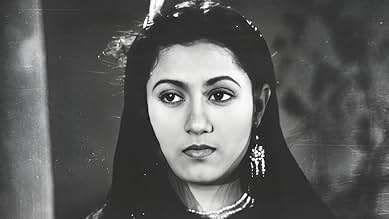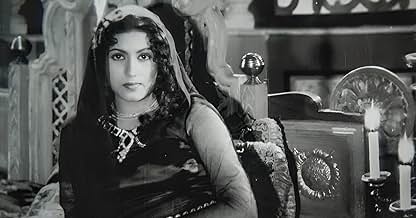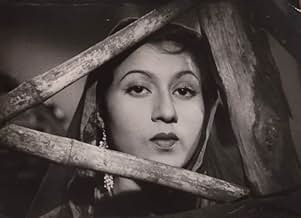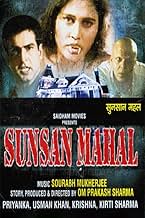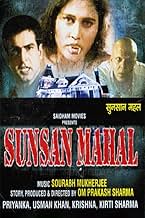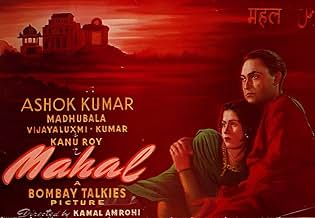Adicionar um enredo no seu idiomaA young lawyer is involved with a ghostly woman in his new house, where the builder and his fiancée died shortly after it was built.A young lawyer is involved with a ghostly woman in his new house, where the builder and his fiancée died shortly after it was built.A young lawyer is involved with a ghostly woman in his new house, where the builder and his fiancée died shortly after it was built.
Avaliações em destaque
A fascinating film: One rainy midnight Hari Shankar (played by Ashok Kumar) drives up to his palace, enters a rather strange world and finds himself immediately "bewitched by a woman's wandering soul". The story has it that Kamini (the young but already veteran Madhubala) is waiting for the re-incarnation of her dead lover from years before, which he fervently believes himself to be and she keeps popping up in front of him rousing his insane desire. To emphasise the romantic point the main song, Aayega Aanewala (the one destined to return will come
) is reprised throughout the film, a deeply poetic and thoughtful classic sung by the young Lata and the one that helped to make her name.
It started out very stylish and original with some swift camera work, almost like an atmospheric Hindi Noir, and reminded me at various times of Orphee, Gilda, Lady From Shanghai, Ghost And Mrs Muir, and even had pre-echoes of Ava Gardner in Pandora And The Flying Dutchman. But eventually the plot veered away erratically and although always interesting some of the suspense was lost as the supernatural aspect was lessened and the ordinary world started to creep in. For the climax Ranjana's integrity was definitely compromised in her wreaking terrible revenge on husband Shankar! The incredibly worldly-wise wispy Kamini murmured "Come" and Shankar ran to her – but what man wouldn't! The scenes with the tribal woman dancing for her life were riveting viewing; the music was superb throughout – of course this was made decades before the heavily Westernised Bollywood Beat took over. The "surprise" climax has already been given away in a previous post, but to me the big surprise is how it could have surprised anyone in the original audiences! And was it destined to end that way, with people watching nowadays destined to not be surprised at all?
It was a confusing mystery melodrama with many heavy thoughts on youth, beauty and mortality but ultimately surprisingly shallow – probably depending on your age. However no matter how much it reminded me of a few other films you'll not see a film quite like it, and personally it's usually well worth watching unique films from the Golden Age.
It started out very stylish and original with some swift camera work, almost like an atmospheric Hindi Noir, and reminded me at various times of Orphee, Gilda, Lady From Shanghai, Ghost And Mrs Muir, and even had pre-echoes of Ava Gardner in Pandora And The Flying Dutchman. But eventually the plot veered away erratically and although always interesting some of the suspense was lost as the supernatural aspect was lessened and the ordinary world started to creep in. For the climax Ranjana's integrity was definitely compromised in her wreaking terrible revenge on husband Shankar! The incredibly worldly-wise wispy Kamini murmured "Come" and Shankar ran to her – but what man wouldn't! The scenes with the tribal woman dancing for her life were riveting viewing; the music was superb throughout – of course this was made decades before the heavily Westernised Bollywood Beat took over. The "surprise" climax has already been given away in a previous post, but to me the big surprise is how it could have surprised anyone in the original audiences! And was it destined to end that way, with people watching nowadays destined to not be surprised at all?
It was a confusing mystery melodrama with many heavy thoughts on youth, beauty and mortality but ultimately surprisingly shallow – probably depending on your age. However no matter how much it reminded me of a few other films you'll not see a film quite like it, and personally it's usually well worth watching unique films from the Golden Age.
Cited as Bollywood's first horror film and also noteworthy for catapulting both its lead actress & playback singer into stardom, Mahal is as gothic as it is enchanting and as elegantly crafted as it is enigmatic in its storytelling. Making expert use of lighting, shadows & setting to establish its eerie atmosphere that brims with mystery & melancholy and further elevated by fine inputs from its committed cast, this haunted house horror juggles love, longing, death, reincarnation & class struggles with flair. Madhubala is an absolute delight but the long runtime, dated elements & plentiful songs do make the ride a bit tedious. However, the artistic rendition & neat camerawork leaves one wondering how Bollywood horror fell so low after starting on such an arresting & impressive note. In short, a fascinating gothic romance chiller.
I completed watching the first psychological horror film of India, Mahal (1949). The film of Kamal Amrohi, which catapulted the careers of actress Madhubala and playback singer Lata Mangeshkar, is eerily satisfying to watch and has ambiguities which show the rawness of the plot itself.
The song "Ayega Aane Wala" became a trendsetter, influencing generations of Indian horror cinemas to carry a haunting yet soothing title track. The legendary Ashok Kumar's mental upheaval is portrayed as vaguely as is the aura of the entire "Mahal".
The overall movie seems to be stretchy but the final climax turns the table and makes the audience wonder the skill of Amrohi's direction. Although the film doesn't explain on the existence of supernatural or the haunting coincidence of rebirth, I feel the taste of this dangling doubt leaves a lasting mark on its legacy which went on to inspire classics like Madhumati, Bees Saal Baad, Karz or Om Shanti Om.
Lastly, I observed the prehistoric form of horror storytelling, aptly commendable for the filmmaking of 1949. The takeaway from this movie is definitely the absurdism of storytelling, which thins the line between natural and supernatural, and questions the sanity and extent of human love.
The song "Ayega Aane Wala" became a trendsetter, influencing generations of Indian horror cinemas to carry a haunting yet soothing title track. The legendary Ashok Kumar's mental upheaval is portrayed as vaguely as is the aura of the entire "Mahal".
The overall movie seems to be stretchy but the final climax turns the table and makes the audience wonder the skill of Amrohi's direction. Although the film doesn't explain on the existence of supernatural or the haunting coincidence of rebirth, I feel the taste of this dangling doubt leaves a lasting mark on its legacy which went on to inspire classics like Madhumati, Bees Saal Baad, Karz or Om Shanti Om.
Lastly, I observed the prehistoric form of horror storytelling, aptly commendable for the filmmaking of 1949. The takeaway from this movie is definitely the absurdism of storytelling, which thins the line between natural and supernatural, and questions the sanity and extent of human love.
Its so beautiful. Think it is probably the best gothic romance ever. From the grand music to the doomed lovers it has everything.
Also its shot beautifully. Almost like a surreal dream.
Also its shot beautifully. Almost like a surreal dream.
This is classic in real sense of the word. A tight suspense from beginning to end. Mahal is one of the greatest films ever made in Bombay filmdom. Adding to the suspense is all time great song 'Aayega aane wala...'. See it for a very young Madhubala and highly expressive Ashok Kumar. Kamal Amrohi has not made any better movie than this one. Though his 'Daira' is another great hidden classic. He is primarily remembered for 'Pakeeza'. Very few films gained the status this film achieved. This is certainly one of the ten best from Bombay. The story has twisting end which will certainly surprise you and you will never be the same again. Most of the movie was shot indoors, one can easily tell that comparing it to modern standards, yet the directorial perfection is amazing. A must see.
Você sabia?
- CuriosidadesDuring the recording of the film music, a man carelessly said that if the film didn't prove to be a hit it would be because of the music. When the film was released, however, the music was extremely popular, and music director Khemchand Prakash received letters from all over India. Even though he was ill at the time, Prakash went to that man's house and made him read all those letters.
Principais escolhas
Faça login para avaliar e ver a lista de recomendações personalizadas
- How long is Mahal?Fornecido pela Alexa
Detalhes
Bilheteria
- Orçamento
- ₹ 4.500.000 (estimativa)
- Tempo de duração
- 2 h 45 min(165 min)
- Cor
- Proporção
- 1.37 : 1
Contribua para esta página
Sugerir uma alteração ou adicionar conteúdo ausente

